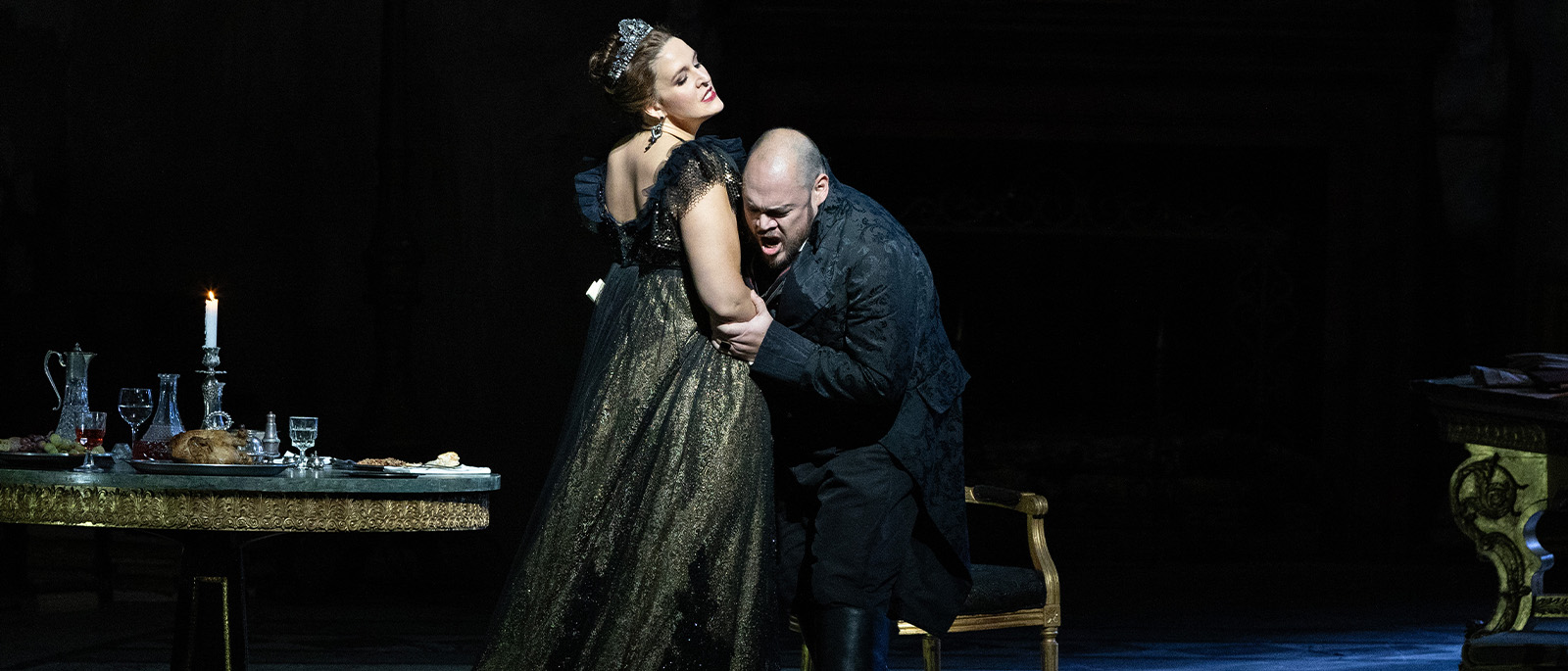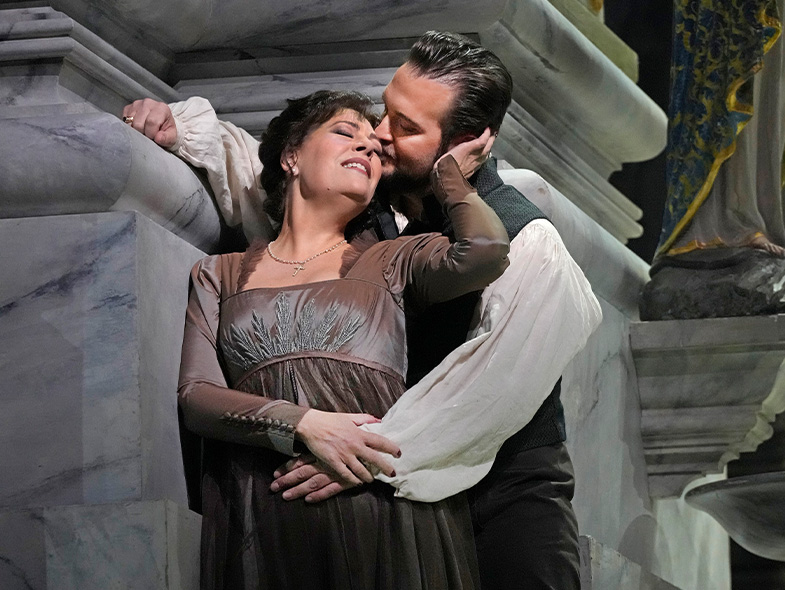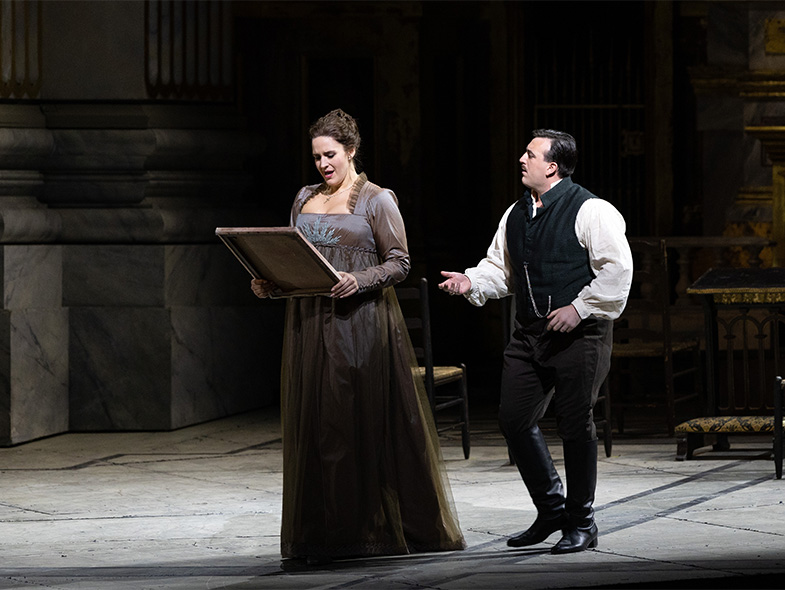
Giacomo Puccini
Tosca
LIVE IN HD
Overview
ENCORE SCREENINGS OF THE LIVE TRANSMISSION WILL BE SHOWN IN SELECT U.S. CINEMAS ON DECEMBER 4. Additional encore dates will vary internationally. Find your theater here.
Extraordinary soprano Lise Davidsen stars as the volatile diva Floria Tosca for her first time at the Met. David McVicar’s thrilling production also features tenor Freddie De Tommaso in his eagerly anticipated company debut as Tosca’s revolutionary lover, Cavaradossi, and powerhouse baritone Quinn Kelsey as the sadistic chief of police Scarpia. Met Music Director Yannick Nézet-Séguin conducts the electrifying score, which features some of Puccini’s most memorable melodies. This live cinema transmission is part of the Met’s award-winning Live in HD series, bringing opera to movie theaters across the globe.
English StreamText captioning is available for the Met’s transmission of Tosca here. A transcript of the transmission will also be available to view after the live performance.
Buy tickets for Tosca live in the opera house here.
Production a gift of Jacqueline Desmarais, in memory of Paul G. Desmarais Sr; The Paiko Foundation; and Dr. Elena Prokupets, in memory of her late husband, Rudy Prokupets
Major support from Rolex
The Met gratefully acknowledges the support of the Gramma Fisher Foundation, Marshalltown, Iowa
Revival a gift of The Joseph and Robert Cornell Memorial Foundation, Mastercard, and Rolex
SUNG IN
ITALIAN
Timeline
Timeline for the show, Tosca
ESTIMATED RUN TIME
3 HRS 30 MINS, WITH TWO INTERMISSIONS

Premiere: Teatro Costanzi, Rome, 1900. Puccini’s melodrama about a volatile diva, a sadistic police chief, and an idealistic artist has offended and thrilled audiences for more than a century. Critics, for their part, have often had problems with Tosca’s rather grungy subject matter, the directness and intensity of its score, and the crowd-pleasing dramatic opportunities it provides for its lead roles. But these same aspects have made Tosca one of a handful of iconic works that seem to represent opera in the public imagination. Tosca’s popularity is further secured by a superb and exhilarating dramatic sweep, a driving score of abundant melody and theatrical shrewdness, and a career-defining title role.
Creators
Giacomo Puccini (1858–1924) was immensely popular in his own lifetime, and his mature works remain staples in the repertory of most of the world’s opera companies. His operas are celebrated for their mastery of detail, sensitivity to everyday subjects, copious melody, and economy of expression. Puccini’s librettists for Tosca, Giuseppe Giacosa (1847–1906) and Luigi Illica (1857–1919), also collaborated with him on his two other most enduringly successful operas, La Bohème and Madama Butterfly. Giacosa, a dramatist, was responsible for the stories, and Illica, a poet, worked primarily on the words themselves.
PRODUCTION
David McVicar
SET and COSTUME DESIGNER
John Macfarlane
LIGHTING DESIGNER
David Finn
MOVEMENT DIRECTOR
Leah Hausman

COMPOSER
Giacomo Puccini
Setting

No opera is more tied to its setting than Tosca, which takes place in Rome on the morning of June 17, 1800, through dawn the following day. The specified settings for each of the three acts—the Church of Sant’Andrea della Valle, Palazzo Farnese, and Castel Sant’Angelo—are familiar monuments in the city and can still be visited today. While the libretto takes some liberties with the facts, historical issues form a basis for the opera: The people of Rome are awaiting news of the Battle of Marengo in northern Italy, which will decide the fate of their symbolically powerful city.
Music
The score of Tosca (if not the drama) itself is considered a prime example of the style of verismo, an elusive term usually translated as “realism.” The typical musical features of the verismo tradition are prominent in Tosca: short arias with an uninhibited flood of raw melody, ambient sounds that blur the distinctions between life and art, and the use of parlato—words spoken instead of sung—at moments of tension.

Share This Page
Social Share
Copied